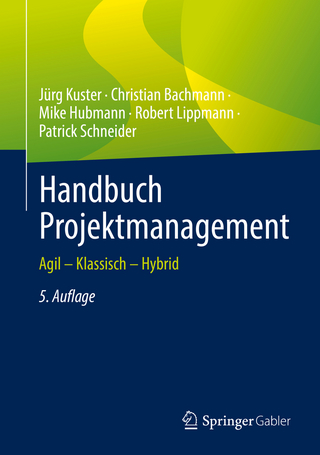
Managing Complex Construction Projects
Auerbach (Verlag)
978-1-032-47628-5 (ISBN)
To many program, project, or construction managers, a complex project seems to be a labyrinth with many hidden dangers. This book is a guide through that labyrinth. It explains best practices and provides insight so they cannot only identify hidden dangers but also effectively manage the construction process to either mitigate or eliminate these risks.
The book presents a systems-based approach to construction project management that can facilitate a greater understanding of the complexity inherent in large construction projects and how that complexity can be effectively managed. The systems approach permits the onsite construction project manager to take a complex construction project, break it down into manageable pieces, and ensure that all systems are in alignment with the original goal of the project. This approach combines industrial engineering, project management, and finance into a unified approach for effective management of complex construction projects, ranging from a power plant to a highway project.
The book explains how to manage construction projects successfully through an approach based on the three following systems:
Project Management System
Work Management System
Quality Management System
The problem with complex programs and projects is that many managers are only equipped with a knowledge of project management. A system for construction is a collection of many processes effectively working together to produce a specific deliverable, which is usually defined in the program or project’s contract. This system has a series of specific inputs and outputs, which are what the customer expects from the company or companies performing the work. This book develops checklists based on these inputs and outputs, which managers can use when first arriving onsite, and provides a "nuts and bolts" approach for managing a complex construction project onsite.
The author shares valuable lessons learned during a career of more than thirty years of working on various construction sites around the world. These lessons learned are filled with valuable information to aid readers become more effective as a program, project, or construction manager of complex construction projects.
John Briesemeister is a Vietnam Veteran and a licensed Project Management Professional since 2007, began his construction experience as a Site Senior Mechanical Engineer on a large nuclear construction project upon graduation from the University of Minnesota in June 1981. He has continued working in the power industry as an Engineer, Construction Manager, Site Manager, and Project Manager since the mid1980s, and he expanded his academic education to include an MBA in 1994, a Master’s degree in Industrial Engineering (MSIE) in 2003, and a Master’s degree in Project Management (MSPM) in 2015. This author has successfully worked in the field on various large, complex construction projects for the past thirty years. In 2016, he was awarded the Donald S. Barrie Award in Construction Management at the PMI® Global Congress for his paper "Construction Execution Plan Alignment for Successful Construction Projects."
Dedication
Contents
Foreword
Preface
Acknowledgments
About the Author
Chapter 1: Introduction
Chapter 2: Project Management System: Part I
Chapter 3: Project Management System: Part II
Chapter 4: Project Management System: Part III
Chapter 5: Work Management System
Chapter 6: Quality Management System
Chapter 7: Bringing It All Together
Chapter 8: Lessons Learned from the Field
Glossary
Index
| Erscheinungsdatum | 11.01.2023 |
|---|---|
| Reihe/Serie | Best Practices in Portfolio, Program, and Project Management |
| Zusatzinfo | 25 Illustrations, black and white |
| Verlagsort | London |
| Sprache | englisch |
| Maße | 156 x 234 mm |
| Gewicht | 540 g |
| Themenwelt | Technik ► Bauwesen |
| Wirtschaft ► Betriebswirtschaft / Management ► Projektmanagement | |
| ISBN-10 | 1-032-47628-1 / 1032476281 |
| ISBN-13 | 978-1-032-47628-5 / 9781032476285 |
| Zustand | Neuware |
| Informationen gemäß Produktsicherheitsverordnung (GPSR) | |
| Haben Sie eine Frage zum Produkt? |
aus dem Bereich


